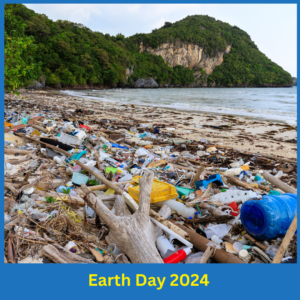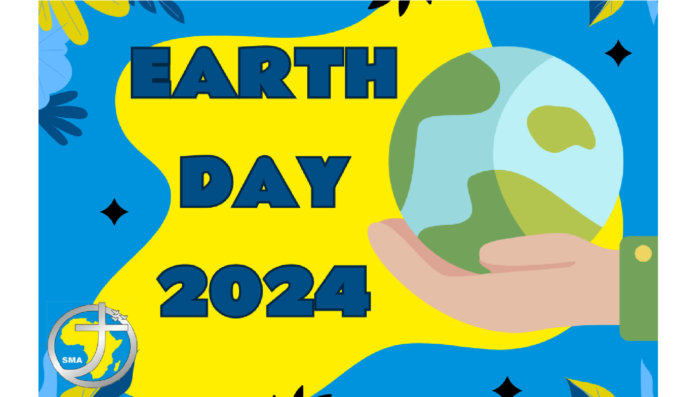– A billion plastic beverage containers were sold last year in the United States.
|
Each year since 1970 April 22 has been designated as Earth Day – a day to demonstrate support for environmental protection and a reminder of the importance of environmental conservation and sustainability. It is also an occasion for encouraging us to come together and take action for a healthier planet.
The theme for 2024 is Planet vs. Plastics and to mark that Earthday.org has called for a 60% global reduction in plastic production by 2040. To achieve this reduction EARTHDAY.ORG’s goals are:
(1) promoting widespread public awareness of the damage done by plastic to human, animal, and all biodiversity’s health and demanding more research be conducted on its health implications, including the release of any and all information regarding its effects to the public;
(2) rapidly phasing out all single use plastics by 2030 and achieving this phase out commitment in the United Nations Treaty on Plastic Pollution in 2024;
(3) demanding policies ending the scourge of fast fashion and the vast amount of plastic it produces and uses; and
(4) investing in innovative technologies and materials to build a plastic-free world.
ON THIS EARTH DAY CONSIDER WHAT YOU CAN DO AND HOW YOU USE PLASTIC – it is something we need we but we certainly do not need as much as we use.
“The word environment means what surrounds you. In the case of plastics we have become the product itself – it flows through our blood stream, adheres to our internal organs, and carries with it heavy metals known to cause cancer and disease. Now this once-thought amazing and useful product has become something else, and our health and that of all other living creatures hangs in the balance,” said Kathleen Rogers, President of EARTHDAY.ORG. “The Planet vs. Plastics campaign is a call to arms, a demand that we act now to end the scourge of plastics and safeguard the health of every living being upon our planet.”
Plastics extend beyond an imminent environmental issue; they present a grave threat to human health as alarming as climate change. As plastics break down into microplastics, they release toxic chemicals into our food and water sources and circulate through the air we breathe. Plastic production now has grown to more than 380 million tons per year. More plastic has been produced in the last ten years than in the entire 20th century, and the industry plans to grow explosively for the indefinite future.
 “All this plastic was produced by a petrochemical industry with an abysmal record of toxic emissions, spills, and explosions,” said Denis Hayes, Chair Emeritus of EARTHDAY.ORG. “Plastics are produced in polluting facilities that somehow seem to always be located in the poorest neighborhoods. Some plastics are lethal when combusted; other plastics transmit hormone-disrupting chemicals; and all plastics can starve birds and suffocate sea life. At every stage of their life cycles, from the oil well to the town dump, plastics are a dangerous blight.”
“All this plastic was produced by a petrochemical industry with an abysmal record of toxic emissions, spills, and explosions,” said Denis Hayes, Chair Emeritus of EARTHDAY.ORG. “Plastics are produced in polluting facilities that somehow seem to always be located in the poorest neighborhoods. Some plastics are lethal when combusted; other plastics transmit hormone-disrupting chemicals; and all plastics can starve birds and suffocate sea life. At every stage of their life cycles, from the oil well to the town dump, plastics are a dangerous blight.”
More than 500 billion plastic bags—one million bags per minute—were produced worldwide last year. Many plastic bags have a working life of a few minutes, followed by an afterlife of centuries. Even after plastics disintegrate, they remain as microplastics, minute particles permeating every niche of life on the planet.
People seldom think of water when they think of plastics. But making a plastic water bottle requires six times as much water as the bottle itself contains.
 EARTHDAY.ORG demands the International Negotiating Committee on Plastic Pollution (INC) mandate the end of production of single-use plastic by 2030 in the Global Plastics Treaty. Moreover, it demands the treaty be implemented using the precautionary principle and the polluter pays doctrine. (Source: https://www.earthday.org/planet-vs-plastics/ )
EARTHDAY.ORG demands the International Negotiating Committee on Plastic Pollution (INC) mandate the end of production of single-use plastic by 2030 in the Global Plastics Treaty. Moreover, it demands the treaty be implemented using the precautionary principle and the polluter pays doctrine. (Source: https://www.earthday.org/planet-vs-plastics/ )
Prayer for the Earth
Creator God, this earth is beautiful and fragile.
Forgive our confusion and inaction as we confront the challenges of climate change.
In the light of your truth, seen so clearly in the life and teachings of Jesus, help us to re-examine ourselves and our lifestyle choices and see clearly the implications of how we live on all that sustains life on earth.
May we follow your leading in caring for every aspect of this precious world, which you made and love.
Throughout history you have moved people to do amazing things for the sake of their neighbours and especially the poor.
Inspire us now to work together, as your people, to change priorities in the way we live so that we build a fair and safe world for all your creation and for future generations.
Amen

